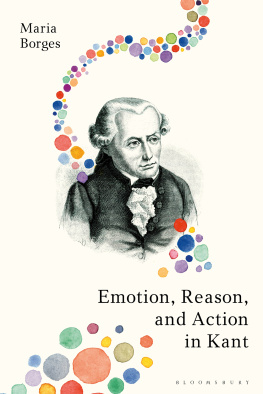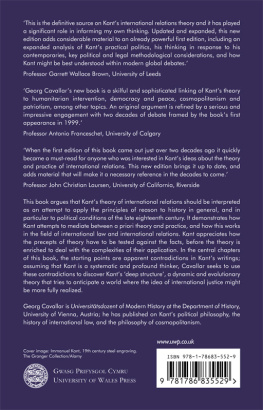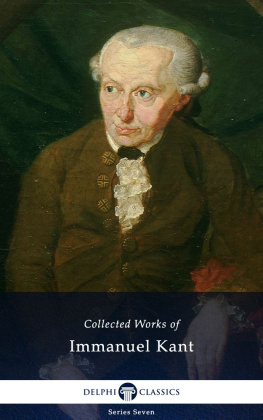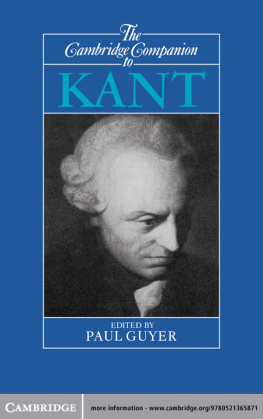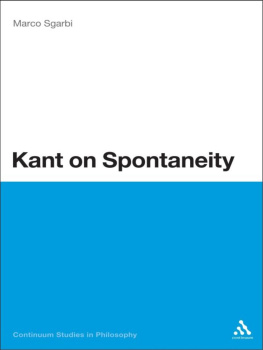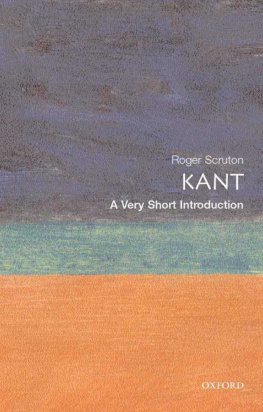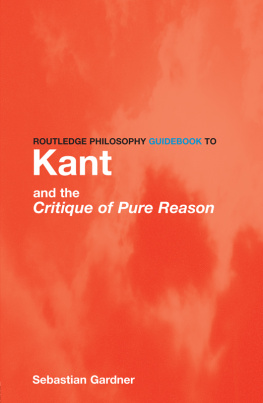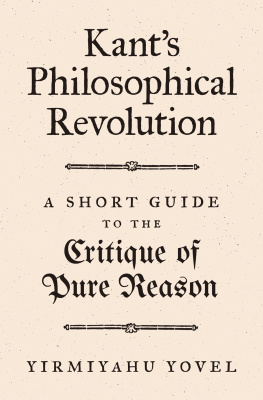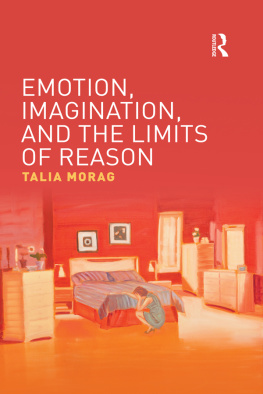EMOTION, REASON, AND ACTION IN KANT
ALSO AVAILABLE FROM BLOOMSBURY
Kants Transition Project and Late Philosophy , Oliver Thorndike
Kant on Spontaneity , Marco Sgarbi
The Visibility of the Image , Lambert Wiesing
Aesthetics, Arts, and Politics in a Global World , Daniel Herwitz
To Laydes and Paulo Borges (in memoriam)
EMOTION, REASON, AND ACTION IN KANT
MARIA BORGES

Contents
I began to write this book in 1999 during my stay as a visiting scholar at the University of Pennsylvania, supported by a CAPES/Brazil fellowship. I would like to thank Paul Guyer for his suggestions and comments on the earlier versions of some chapters, and the former Kant Group of the Department of Philosophy of the University of Pennsylvania, especially Julian Wuerth, Cynthia Schossberger, Lucas Thorpe, and James Trainor. Some parts of the book were written during my stay at the Humboldt Universitt, Berlin, from 2006 to May 2007, supported by a CAPES fellowship. I would like to thank Rolf Peter Horstmann, Dina Edmundts, Tobias Rosefeldt, Stefanie Grne, and Brendan Theunissen for their discussion of my ideas. This book was finally finished at Columbia University, where I spent a semester in 2014. I want to thank Patricia Kitcher for that.
I would also like to thank my university, the University of Santa Catarina, for the leaves that made it possible to write this book and CAPES for the scholarship that allowed me to live abroad. I thank the CNPQ, which gave me a grant in Brazil, and the Brazilian government for its educational incentives.
I would also like to thank Robert Louden, Gary Hatfield, Jeniffer Mensh, Karl Ameriks, the late Valerio Rohden, Zeljko Loparic, Guido de Almeida, Christian Hamnn, Andre Klaudat, Alfredo Storck, Jlio Esteves, the late Juan Bonacinni, Vera Bueno, Vincius Figueiredo, Christian Hamm, Virgnia Figueiredo, Pedro Rego, and the late Cllia Martins, Daniel Omar Perez, who helped me to improve this book through the discussion of the earlier versions of some chapters. I would like to thank my colleagues Delamar Dutra, Darlei Dall'Agnol, Luiz Henrique Dutra, Marco Frangiotti, Alessandro Pinzani, and Claudia Drucker for their discussion of some issues in the book.
I am also very grateful to Alvaro Prata for his intellectual encouragement and to Pablo Muchnik who stimulated me to publish this book.
Kant sources
Kants gesammelte Schriften ( Kniglich Preussischen Akademie der Wissenschaften , Berlin: Walter de Gruyter & Co., 1900).
AntM | Anthropologie Mrongovius (1784/85) (AA 25) |
Ant | Anthropologie in pragmatischer Hinsicht (AA 7) |
AntC | Anthropologie Collins (1772/73) (AA 25) |
AntPa | Anthropologie Parow (1772/73) (AA 25) |
G | Grundlegung zur Metaphysik der Sitten (AA 4) |
KpV | Kritik der praktischen Vernunft (AA 5) |
M | Vorlesungen ber Metaphysik (AA 28, 29) |
MM | Metaphysik Mrongovius (AA 28) |
MS | Metaphysik der Sitten (AA 6) |
Rek | Rektoratsrede (AA 15) |
Rel | Religion innerhalb der Grenzen der blossen Vernunft (AA 6) |
TL | Tugendlehre |
VE | Vorlesungen ber Ethik (AA 27) |
The Critique of Pure Reason (KrV) will be cited according to the editions A (first edition) and B (second edition).
I used the translation of the Cambridge Edition of the Works of Immanuel Kant, with the exception of the Anthropology from a Pragmatic Point of View , for which I used Victor Dowdells translation, in: Kant, Anthropology from a Pragmatic Point of View , Southern Illinois University Press, 1978.
This is a book about practical reason, action, and emotion in Kant. My aim is to answer what is the real importance of emotion for Kant. I will try to show that Kant had considerable views about emotions and that he was not blind to their importance in action in general. My object is not moral action, but action in general, including weak and even evil ones. My purpose is to show that Kant dedicated a considerable part of his work to the study of the relation between reason and emotion.
In Chapter 1, I analyze Kants theory of action and what can count as a reason for or cause of an action. First, I begin with the distinction between motiva and stimulus in the pre-critical lessons on ethics and metaphysics. In the Groundwork , Kant explains this distinction in terms of objective and subjective grounds for actions: the motive ( Bewegungsgrund ) is the objective ground of an action and the incentive ( Triebfeder ) is the subjective one. Next, I analyze the possibility of the overdetermination of actions, understood as the possibility of two possible causes for the same action. I will argue that according to the incorporation thesis, there is only one motive for an action.
Second, I try to reconcile the weakness of the will and the incorporation thesis. I will show that, according to the incorporation thesis, Kant is committed to a strong thesis concerning causation of actions. Reason and only reason can be the cause of an action. If we accept weakness, however, we must have a humbler solution to the Kantian theory of action: the domain of rational agency does not have the same extension of voluntary action. In the model of rational agency there is no room for weakness, although it is a fact in real actions. The domain of the voluntary is, then, wider than the domain of rational agency. The weakness of the will applies to the first and the incorporation thesis applies only to the second.
In Chapter 2, I shall analyze whether human beings can act morally without being moved by sensible feelings. I will show that the answer in the Critique of Pure Reason , the Groundwork , and the Critical of Practical Reason is undoubtedly yes, but that Kant is ambiguous in The Metaphysics of Morals and also in the Anthropology . In the Metaphysics of Morals , Kant claims that there are some sensible conditions for the reception of the concept of duty: moral feeling, conscience, love of ones neighbor, and respect for one self (self-esteem). I examine moral feeling and the love of human beings, trying to figure out whether or not they are necessary sensible preconditions for moral actions.
In Chapter 3, I ask whether there is a place for affects and passions in the Kantian system. I intend to show that this place is the empirical part of morals, which can be understood as anthropology. I follow the development of the idea of anthropology in Kants moral works, showing the division between a moral metaphysics and a practical anthropology, aiming at exploring the impure part of Kantian ethics. I also try to compare the concepts of practical anthropology, pragmatic anthropology, and transcendental anthropology.
In Chapter 4, I analyze Kants theory of emotions and what he can teach us about them. I will challenge two models that have been used to explain his theory. I begin with Sabini/Silvers position, according to which emotions for Kant follow the pain model: they are precognitive and involuntary phenomena. Next, I analyze Barons objection, according to which Kant held that we are responsible for our emotions. I argue that both interpretations are misleading. First, I show that there is not a unique model for emotions in Kant. In his work, there is a continuum from uncontrollable emotions, like anger, to those which can be cultivated and rationally controlled. The voluntariness and involuntariness of emotions as well as their capacity for being cultivated depends on their relation to the passive, reactive, or active self. Second, I argue that Kants account of emotion includes both physiological aspects and cognitive contents, mainly evaluative beliefs. However, the variety of emotions presents us with different proportions of these two elements. I conclude that Kantian moral theory contributes an outstanding theory of emotions to contemporary debates, one which acknowledges physiological as well as cognitive aspects, without forgetting their diversity.

